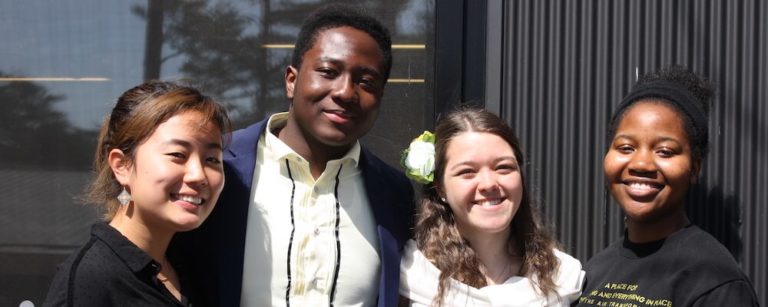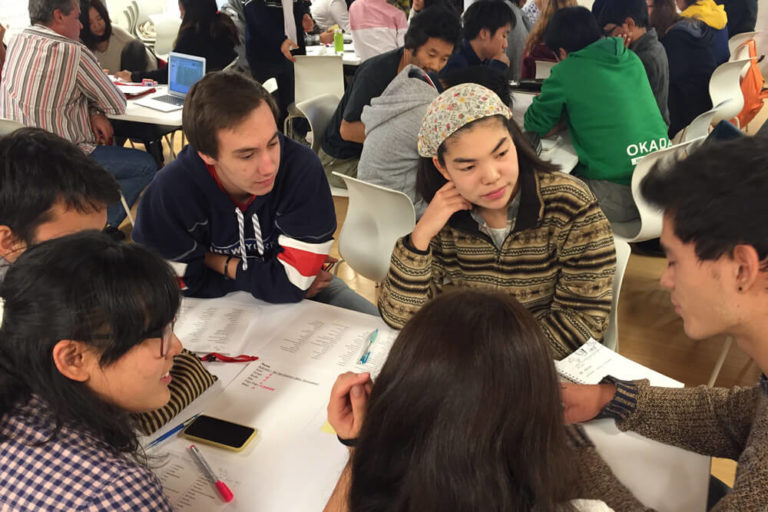 Written by Izumi Tsurumi
Written by Izumi Tsurumi
Ms. Tsurumi coordinates the Leadership program at UWC ISAK Japan.
日本語訳は、英文ブログ後にあります。
When you don’t meet eye to eye with someone, when was the last time you responded by saying “tell me more…”?
Instead, what are our tendencies to respond to a conflict in opinions? Judging what the other person said, defending our point of view profusely, coercing the other person to take our point of view, or keeping our mouth shut? All of these behaviors are a result of us perceiving difference as a problem, and when faced with a conflict, one of us is right and the other one, wrong.
At UWC ISAK Japan, we have people of many different backgrounds — culturally, religiously, socioeconomically — and there are bound to be times when we don’t meet each other eye to eye. So often, we don’t interact with our differences in a way that builds connections and moves us forward us a community. This is because most conflicts happen at the level of positions and strategies, and we view conflicts as win/lose scenarios. To give an example from our daily life, in our houses, we may have a situation where trash is all mixed up, and some students who have the roles to clean up and separate the trash are frustrated. In this case, we often hear the argument of “you didn’t separate out the trash, it is annoying that I need to separate the trash, so please separate it from now on!” This is a typical case of “I am right, you are wrong” approach to meeting a conflict.

What is important for us to recognize however is that there is a level of “human need” that is driving these strategies/behaviors in each of us. Everything we do, we do to meet a need. These needs are universal, and we need them to survive and thrive as humans (examples can be found here). Sometimes the strategies we apply to meet these needs are conscious and logical, and sometimes they are not. However, if we can take the time to ask each other and find out what the human needs are that are driving these behaviors, then we can get past the conflict of strategies and positions and understand each others’ needs that are rooted in our humanness. In this example, the need that is driving those to mix the trash may be that they need ease in their life, and the need of the person who is cleaning the trash could also be ease, along with respect and responsibility. If we can curiously and openly listen to and understand each others needs and values, we can then come up with different ways of meeting both of our needs, that is past simply separating out the trash. Perhaps the need of ease could be met in other areas of their residential life, in very creative ways.
In our Leading Self course, we are currently building skills to understand the nature of conflicts, to develop deep empathy for each other to learn about each other’s needs, and to be creative with our solutions so that we can meet as many needs as possible. What if each of us can adopt a mindset that difference is only natural and that a conflict can be a win/win ground for learning? In order to create a community that builds connections in the midst of differences, it requires that each of us is paying attention to our human needs that are driving our behavior, and are willing to be vulnerable and share them with others. We also need to purposefully meet conflicts with intentions to understand others at the level of human needs.
What if we all took a chance and practiced this? Could we transform our community from a simple co-existence of different opinions, ideas and identities in separate pockets, to one where we are seeking to understand each others’ human needs beyond our superficial differences, and actively creating a community where the various human needs can be fulfilled? Now, that would be practicing transformational leadership to create a community for a peaceful and sustainable future.
多様性の中での解決
UWC ISAK Japanでは、宗教、文化、経済など様々なバックグラウンドの生徒、及び教師がおります。 生徒同士日々の生活の中で意見がぶつかる事はもちろんあります。 一般的には、自分と異なる価値観には目を伏せ、 価値観の相違からお互いを理解する価値観は生まれにくく、社会を大きく前進させるべきチャンスを見失っております。これは大いに、対立が立場や戦略レベルでの対立であり、衝突を勝ち負けで判断するためです。
しかし、我々が認識すべき重要なことは、私たちのそれぞれの戦略/行動を動かす原動力には「人間の必要性」というレベルがあるということです。私たちはニーズがあるから行動するのです。これらのニーズは普遍的なものであり、人間として生き残り、繁栄するために必要です。これらのニーズを満たすために適用する戦略は、意識的かつ論理的であり、時にはそうでない場合もあります。しかし、私たちはお互い立ち止まり、実際人間のニーズがこれらの行動を必然としているかどうかを知ることができれば、戦略や立場の葛藤を乗り越え、私たちの人間性に根ざす理解が生まれるのです。好奇心とオープンマインドでお互いのニーズや価値観に耳を向け聞くことができれば、私たちは両方のニーズを満たすさまざまな方法を思いつくことができます。
リーディング・セルフ・コースでは、現在、対立の性質を理解し、互いのニーズを学び、創造力を発揮してできるだけ多くのニーズに対応できるスキルを身につけています。私たち一人ひとりの違いは自然であり、対立はウィン・ウィンの為の一歩だという認識を仮に持てたらどうでしょうか。違いの中でつながりを作り出すコミュニティをつくるためには、私たち一人ひとりが行動を起こす上での人間のニーズに意識し、脆弱で他者と分かち合う必要があります。また時に私たちは人間のニーズのレベルで他人を理解するためにも意図的に衝突を起こす必要もあります。
我々は、表面的な違いを超えてお互いの人間のニーズを理解し、様々な人間のニーズがあるコミュニティを積極的に創造することこそ、真のトランスフォメーショナルリーダーシップによる社会の実現と捉えております。





